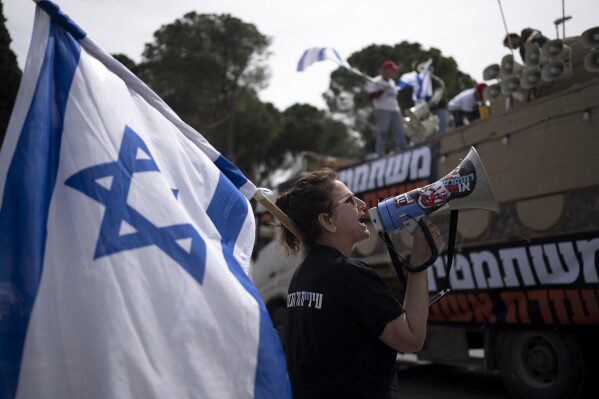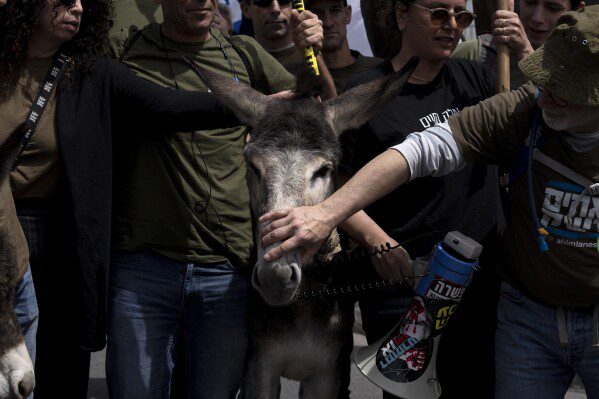Jerusalem (AFP) – While Israel is fighting long battles The war in Gazabroad exemptions from mandatory military service were reopened for ultra-Orthodox men Deep division In the country and shook the government coalition Prime Minister Benjamin Netanyahu His fellow members of the War Cabinet strongly opposed the proposed new conscription law.
By the end of the month, Government of Israel It should introduce legislation aimed at increasing recruitment among the religious community. As the deadline approached, public discourse became increasingly toxic – a departure from the unity demonstrations early in the war.
Netanyahu's government has so far survived the popular anger it has sparked Hamas attack on October 7 Who sparked the war, but the draft case put him in a dilemma. The collapse of the three-member war cabinet would undermine the country's stability at a sensitive time in the fighting. But a loss for the ultra-Orthodox parties would bring down his broader ruling coalition and plunge the country into new elections in which he and his Likud party trail badly in opinion polls.
“Politically, this is one of the most tangible threats to the government,” said Gilad Malach, an expert on ultra-Orthodox affairs at the Israel Democracy Institute, a think tank in Jerusalem.
Most wanted Jewish men To serve Approximately three years followed by years of reserve service. Jewish women serve a mandatory two years. But the politically powerful Ultra-Orthodox, who make up roughly 13% of Israeli society, traditionally receive exemptions if they study full-time in yeshivas. The exemptions – and the government stipends that many seminary students receive until the age of 26 – have angered the general public.
The Supreme Court ruled that the current system was discriminatory and gave the government until April 1 to submit a draft law and until June 30 to pass it.
Yoav Galant and Benny Gantz — who together with Netanyahu form the war government — say the law proposed by the prime minister does not go far enough toward increasing the number of ultra-Orthodox who will join the army. Critics say some aspects, such as raising the exemption age, could lead to lower numbers.
Gantz, Netanyahu Top political rivalHe said he would leave the Cabinet if the conscription law was weakened or failed to pass by the deadline. Defense Minister Gallant said he would only support a new law with the support of Gantz and more centrist members of the country's wartime emergency government.

Members of Brothers and Sisters in Arms and Bonot Alternativa (Women Building an Alternative) protest Israel's exemptions for ultra-Orthodox Jews from mandatory military service, near the Prime Minister's Office in Jerusalem, Tuesday, March 26, 2024. (AP Photo/Maya Alleruzzo ) )
The government consists of ultra-Orthodox and ultra-nationalist religious parties, which were joined in the early days of the war by a faction led by former military generals, including Gantz. The union was intended as a show of unity in the wake of the events of October 7, but the two sides disagree widely on the issue of conscription.
After the Hamas attack… Israel has activated 360,000 reserve soldiersIt is their largest mobilization since the 1973 Middle East War. Many have since been released, but are expected to return to active duty in the coming months. Increasing reserve service and talk of prolonging compulsory service deepened popular anger.
Among Israel's Jewish majority, mandatory military service is largely viewed as a melting pot and a rite of passage. Ultra-Orthodox Jews say integration into the army would threaten their generational way of life, and that their religious lifestyle and dedication to keeping Jewish commandments protects Israel as much as a powerful army.
“We would rather die than serve in the Israeli army,” said Yona Kruskal, 42, a father of 11 children and a full-time seminary student. Blocked traffic In Jerusalem with about 200 others last week in one of the recurring protests against the conscription law. “There is no way you can force us to go into the army, because we are determined that the army and religion are in conflict with each other.”
As ultra-Orthodox Jews clashed with police at the protest, other Israelis berated them, chanting “Shame!” Shame!”
One of the men shouted: “My friends are sitting in Gaza while you are here sitting on the ground.” A woman shouted to the demonstrators that her son was serving in Gaza to protect them.
Oren Shevel, founder of Brothers in Arms, a protest group that represents reservists who oppose Netanyahu, said that ultra-Orthodox Jews benefit from the army's protection without participating. He added: “There is one law for everyone, and it must be applied equally.”
Economists say the system is unsustainable. With a high birth rate, the ultra-Orthodox community is the fastest growing segment of the population, at about 4% annually. Each year, approximately 13,000 ultra-Orthodox males reach the conscription age of 18, but less than 10% of them enlist, according to the Israeli parliament’s State Control Committee, which recently held a hearing on the issue.
“One of the things that was debatable in the past and now has become clearer is that we need more soldiers,” said Yoaz Hendel, a former Netanyahu aide and minister who just completed four months of reserve duty as a special forces commander. lonliness. He said that the burden of service should be shared equally among all sectors of the population.
The shock of the October 7 attack appears to have ignited some enthusiasm among ultra-Orthodox Jews for service, but no significant recruitment process took place, according to Israeli media. The army refused to comment on the rate of ultra-Orthodox Jewish recruitment.

Members of the Brotherhood and Sisters in Arms group stand with a donkey, which chewed a speaker cable, during a protest against Israel's exemptions for ultra-Orthodox Jews from mandatory military service, near the Prime Minister's Office in Jerusalem, Tuesday, March 26, 2024. (AP Photo/Maya Alirozo)
This controversy has long divided Israel, and a series of court decisions have repeatedly found the system to be unfair. But Israeli leaders, under pressure from ultra-Orthodox parties, have repeatedly faltered. It remains unclear whether Netanyahu will be able to do so again.
The dispute over exemptions worsened last year when Netanyahu's government moved forward with reform of the legal system backed by ultra-Orthodox governing partners who sought to override court decisions on conscription. The government froze the reform process after the outbreak of war.
The army has attempted to assimilate ultra-Orthodox Jews by creating separate units that allow them to maintain their religious practices, including reducing interaction with women.
Ephraim Loew, 65, a full-time student at a religious school in the ultra-Orthodox city of Bnei Brak, rejected such efforts, saying that the men who join these units are not “true Haredim,” as the ultra-Orthodox are called in Hebrew.
“The army is the final stage of Israeli education to transform people into secular Israelis and separate them from their Jewish heritage,” said Loew, who described how one of his eight children “lost the path” to full-time education and served in the army. In the army as a truck driver for a year and a half.
One of the country's two senior rabbis, Yitzhak Yosef, said this month that ultra-Orthodox Jews would “all move abroad” if forced to conscript. Malach of the Israel Democracy Institute said the comment drew condemnation because it encouraged Israelis to leave during a national crisis, and ridicule because many secular Israelis would have no problem with ultra-Orthodox Jews leaving en masse.
On the contrary, the ultra-Orthodox leadership's unwillingness to compromise even as other parts of Israeli society are making great sacrifices has further alienated the public, Malach said.
He said: “In this government, I do not see a real opportunity for change.” “But if elections are held and there is a coalition without the Haredim or with the weak Haredim, it is possible that there will be change.”


